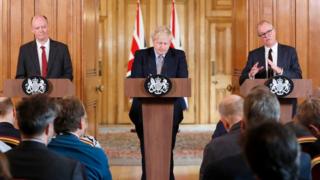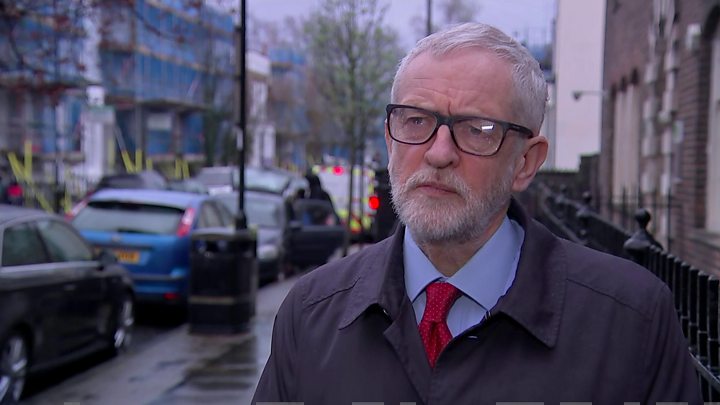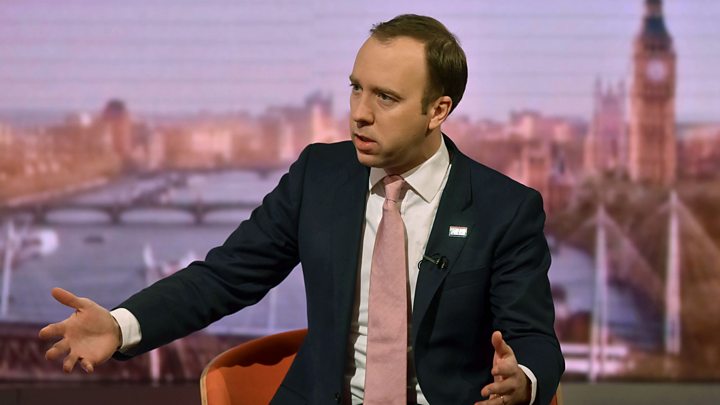Coronavirus: Downing Street to give daily TV briefings on outbreak
 Image copyright
AFP/Getty Images
Image copyright
AFP/Getty Images
The government is to hold daily televised press conferences to update the public on the fight against coronavirus, Downing Street has said.
From Monday, Boris Johnson or a senior minister will address the media to ensure people are informed about how to protect themselves.
It follows criticism of No 10 for an apparent lack of transparency over its plans to stem the spread of the virus.
A total of 35 people have died in the UK after contracting Covid-19.
The briefing later will follow another meeting of the government's emergency Cobra committee, chaired by the prime minister, where further decisions could be made on actions to tackle the spread of coronavirus.
Sir Keir Starmer, a candidate to become the next Labour Party leader, had called for a "daily press conference" over the virus to improve transparency.
He said he was "deeply concerned" that "ministers have been failing in their responsibilities to provide consistent and transparent public health advice".
The announcement of daily updates comes as Transport Secretary Grant Shapps confirmed the over-70s will soon be asked to stay at home for an extended period to protect themselves.
Mr Shapps told BBC Radio 4's Today programme they would still be able to go for a walk outside.
"It's about being sensible but not mixing in crowds," he said.
A Downing Street spokesperson said the government is "committed" to keeping the public informed about what it is doing to fight the spread of the virus, and will always be led by science to "bring forward the right responses at the right time".
Mr Johnson will host the press conference on Monday, alongside Prof Chris Whitty, the UK's chief medical adviser, and chief scientific adviser Sir Patrick Vallance.
The PM or a senior minister will then hold each subsequent daily briefing, and answer media questions, while supported by a range of medical and scientific experts, No 10 said.
The Cobra meeting will discuss the "next steps" on government plans to shield the elderly and vulnerable people from the virus, and whether mass gatherings should be banned.
Most schools across the UK will remain open on Monday, despite blanket closures in countries such as Spain, France and Ireland.
A number have decided to close, however - and Education Secretary Gavin Williamson is due to meet head teachers to discuss their concerns later. Some universities have halted classes and moved all their lectures online.
The Department for Work and Pensions has also announced that, from Tuesday, face-to-face assessments for sickness and disability welfare payments will be suspended for three months in an effort to protect vulnerable claimants.
The suspension will apply to claimants of personal independence payments, employment and support allowance, some on Universal Credit and people on industrial injuries schemes. Those with appointments will be contacted to discuss alternative arrangements.

Meanwhile, Mr Hancock said details of emergency legislation giving the government more powers to deal with the outbreak will be shared on Tuesday.
Hotels could be converted into makeshift hospitals, while the government has begun negotiating with private healthcare providers to obtain thousands of extra beds in private hospitals.
The PM is due to speak to engineering firms on Monday about shifting their production lines to making NHS ventilators, amid growing concern about a shortage of the life-saving equipment.
The government has asked any firms which may be able to help to call the Department for Business on 0300 456 3565 after 10:00 GMT on Monday.
The UK travel industry is becoming increasingly hit by the spread of the virus and public health restrictions.
On Monday, Easyjet announced sweeping flight cancellations and warned of the grounding of the majority of its planes amid widespread travel restrictions throughout Europe.
British Airways' owner IAG has reduced its capacity by "at least 75%" after BA last week warned staff of a fight for its "survival" while an industry body has said the future of British aviation was at stake.
Mr Shapps told BBC Breakfast that "good businesses shouldn't be put out of business" due to the coronavirus.
The transport secretary said meetings were planned with airline leaders and he would discuss potential financial support for businesses with Chancellor Rishi Sunak.
"We will beat this virus but there is no shortcut unfortunately to getting there," he added.
He said Britons currently stuck abroad due to travel restrictions should contact their airline as well as the Foreign Office, by calling +44 (0)207 008 1500, so that the government knows they are trying to return home.
The chairman of the Treasury Select Committee said the whole UK Budget, unveiled by Mr Sunak last week, might have to be re-assessed if the outbreak goes on longer than expected.
Speaking on BBC Radio 4's Westminster Hour, Conservative MP Mel Stride said the forecast the Budget was based on is "already well out of date" and the chancellor could face "some very difficult decisions".

Elsewhere, central banks around the world have taken co-ordinated action to try to limit the economic impact of the pandemic, which is threatening to cause a global recession.
The US has cut interest rates to almost zero and launched a $700bn stimulus programme in a bid to protect the economy.
Mr Johnson is also due to speak with leaders of the G7 nations in a phone call on Monday, in which he will encourage them to back the World Health Organization response and provide funding and expertise to speed up the development of a vaccine.
A Public Health England (PHE) briefing, reported by the Guardian, warned that the epidemic in the UK could last until spring 2021 and put 7.9 million people in hospital.
Dr Susan Hopkins, PHE's national infection service deputy director, said the agency "used reasonable worse-case scenario figures" to "restate the importance for people with symptoms to stay at home".
The number of confirmed UK cases of the virus has reached 1,372, with 40,279 people tested, according to the latest Department of Health figures.
Almost all of the latest cases were in England, but 34 new cases were announced in Wales, 32 in Scotland and 11 in Northern Ireland.
People self-isolating with mild symptoms of the virus are no longer being tested.
The government says tests will primarily be given:
- To all patients needing hospital treatment for pneumonia, acute respiratory distress syndrome (ARDS) or a flu-like illness
- Where an outbreak has occurred in a residential or care setting, for example long-term care facilities or prisons
In other key updates:
How have you been affected by coronavirus? Share your experiences by emailing haveyoursay@bbc.co.uk.
Please include a contact number if you are willing to speak to a BBC journalist. You can also contact us in the following ways: